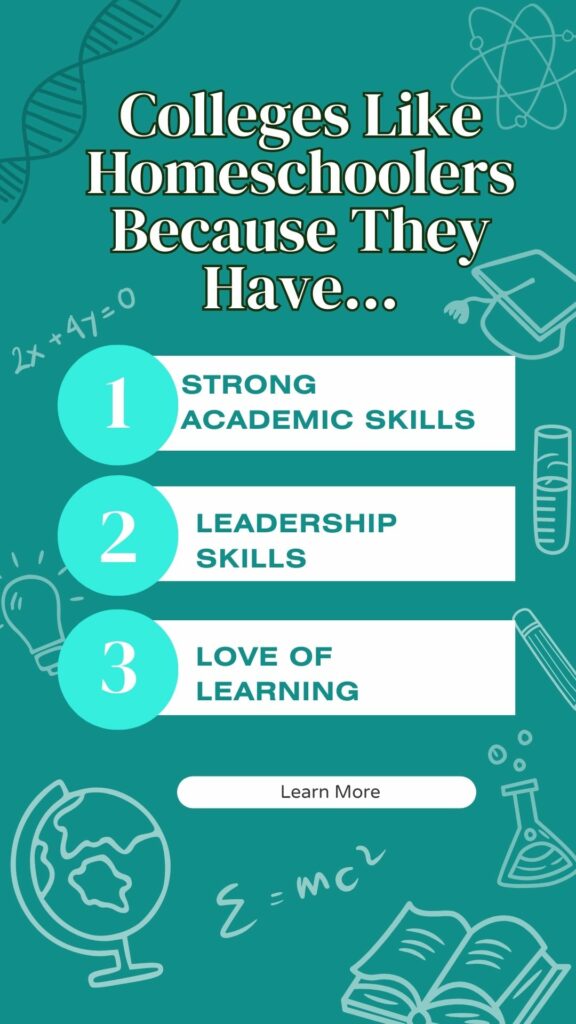When it comes to homeschooling the high school years, many parents have questions when it comes to college applications and how homeschooling affects admittance.
According to a 2019 report by the National Center for Education Statistics, homeschoolers are more likely to attend college than their peers who attend traditional high schools. The report found that 84% of homeschoolers aged 18-24 had taken some college courses, compared to 72% of public school students and 65% of private school students in the same age group.




Another study conducted by the Home School Legal Defense Association found that homeschoolers who applied to college were accepted at a higher rate than the general population of college applicants. The study found that 66.7% of homeschoolers who applied to college were accepted, compared to 57.5% of all college applicants.
Additionally, homeschooled students have been accepted into some of the most prestigious colleges and universities in the country, including Harvard, Yale, MIT, and Stanford.
Here are some answers to those frequently asked questions in regards to homeschooling and college:
Can homeschoolers get into college?




As more and more families opt for homeschooling as a preferred method of education, the question of whether homeschoolers can get into college has become increasingly relevant. The short answer is yes, homeschoolers can definitely get into college. In fact, homeschooled students are being accepted into some of the most prestigious universities in the country.
How do homeschoolers apply to college?
Homeschoolers can apply to college in a similar way to traditional school students, but there are some additional steps and considerations to keep in mind. Here is a step-by-step guide to the college application process for homeschoolers:




- Research colleges and universities – Homeschoolers should research colleges and universities to find those that fit their academic interests, geographic preferences, and other criteria. They should also consider whether the colleges they are interested in have specific admission requirements for homeschoolers.
- Take standardized tests – Many colleges require standardized test scores for admission, such as the SAT or ACT. Homeschoolers should register for and take these tests in the same way that traditional school students do. They may also need to take subject-specific tests such as Advanced Placement (AP) exams.
- Prepare transcripts – Homeschoolers will need to create transcripts that document their academic coursework, grades, and other achievements. The transcript should be organized in a way that is easy for colleges to understand and include information such as the course title, the curriculum used, and the grade received.
- Gather letters of recommendation – Homeschoolers should ask teachers, coaches, or other adults who know them well to write letters of recommendation. These letters should provide insight into the student’s academic abilities, work ethic, character, and other relevant qualities.
- Write essays – Homeschoolers will need to write essays as part of the college application process. They should choose topics that showcase their strengths, experiences, and goals and demonstrate their writing skills.
- Submit the application – Homeschoolers should complete and submit their college applications by the deadline. They should make sure to follow all instructions carefully and include all required documents, such as transcripts, test scores, and letters of recommendation.
Overall, the college application process for homeschoolers requires careful planning and attention to detail. By following these steps and staying organized, homeschoolers can increase their chances of success in the college admission process.
What are colleges looking for in homeschool applicants?




When it comes to homeschool applicants, colleges are generally looking for the same qualities and achievements that they look for in traditional school applicants. However, there are some additional factors that colleges may consider when evaluating homeschool applicants. Here are some things that colleges may be looking for in homeschool applicants:
- Strong academic record – Colleges want to see that homeschoolers have taken rigorous courses and achieved strong grades in their coursework. This can demonstrate their academic ability and preparation for college-level work.
- Standardized test scores – Homeschoolers will need to take standardized tests such as the SAT or ACT, and colleges may weigh these scores heavily in their admissions decisions. Strong test scores can demonstrate a homeschooler’s academic ability and readiness for college-level work.
- Extracurricular activities – Colleges want to see that homeschoolers have pursued extracurricular activities that demonstrate their interests, passions, and leadership abilities. This can include activities such as community service, internships, clubs, sports, or work experience.
- Letters of recommendation – Colleges may place a lot of weight on letters of recommendation from teachers, coaches, or other adults who know the homeschooler well. These letters should provide insight into the student’s academic abilities, character, and work ethic.
- Unique experiences or accomplishments – Homeschoolers may have had unique experiences or accomplishments outside of traditional school settings, such as independent research, travel, or entrepreneurship. These experiences can make them stand out in the college application process and demonstrate their creativity and initiative.
- Transcripts and academic records – Homeschoolers will need to provide transcripts and other academic records that document their coursework and achievements. These records should be organized in a clear and easy-to-understand way and should demonstrate that the homeschooler has taken a challenging and well-rounded course of study.
Overall, colleges are looking for homeschoolers who are well-prepared for college-level work and who have demonstrated their academic ability, leadership, and creativity. By focusing on these areas and providing strong application materials, homeschoolers can increase their chances of being accepted to their top-choice colleges.
Do colleges have different admission requirements for homeschoolers?
Colleges and universities generally do not have different admission requirements for homeschoolers, but they may have different application procedures or additional requirements. Homeschoolers should research the admission policies and procedures of the colleges they are interested in to make sure they understand any specific requirements.
How do homeschoolers create transcripts for college applications?




Homeschoolers can create transcripts for college applications using a variety of methods. Here are some steps homeschoolers can follow to create a transcript:
- Decide on a transcript format – Homeschoolers can choose from a variety of transcript formats, including a traditional transcript, a narrative transcript, or a comprehensive record. The format should be easy to read and include all necessary information.
- Gather academic records – Homeschoolers should gather all academic records, including course descriptions, syllabi, and grades for each course. This information can be used to create a comprehensive transcript.
- Assign credits – Homeschoolers should assign credits to each course based on the number of hours spent on the course and the level of difficulty. Typically, one credit is assigned for 120-180 hours of work.
- Calculate grade point average (GPA) – Homeschoolers should calculate their GPA based on the grades received for each course. A traditional 4.0 scale can be used, with A=4.0, B=3.0, C=2.0, D=1.0, and F=0.0.
- Include extracurricular activities – Homeschoolers should include a section on their transcript that lists extracurricular activities, including community service, internships, clubs, sports, or work experience.
- Add a course summary – Homeschoolers can add a summary of their homeschool program that includes a brief description of their teaching philosophy and any unique aspects of their homeschool education.
- Include any supporting documentation – Homeschoolers may want to include supporting documentation with their transcript, such as letters of recommendation or standardized test scores.
Find more information about How to Create a Homeschool Transcript
Once the transcript is created, homeschoolers should make sure it is organized and easy to read. They can also have it reviewed by a homeschooling association or college admissions counselor to make sure it meets all requirements. By creating a well-organized and comprehensive transcript, homeschoolers can demonstrate their academic abilities and increase their chances of being accepted to their top-choice colleges.
What standardized tests do homeschoolers need to take for college admission?
Homeschoolers need to take the same standardized tests as traditionally-schooled students for college admission. These include:
- SAT: The SAT is a standardized test widely used for college admissions in the United States. The test measures a student’s readiness for college and assesses their skills in reading, writing, and math.
- ACT: The ACT is another standardized test used for college admissions in the United States. It assesses a student’s skills in English, math, reading, and science.
- SAT Subject Tests: Some colleges require or recommend SAT Subject Tests, which are subject-specific tests that measure a student’s knowledge in a particular subject area, such as English literature, chemistry, or world history.
- Advanced Placement (AP) Exams: AP exams are college-level exams that test a student’s knowledge in a particular subject area. Students who earn high scores on AP exams may be eligible for college credit.
Homeschoolers should research the admission policies of the colleges they are interested in to determine which tests are required or recommended. They should also make sure to register for the tests by the appropriate deadlines and prepare for them with study guides and practice exams.
Can homeschoolers receive scholarships for college?
Yes, homeschoolers can receive scholarships for college. Scholarships are available to students of all backgrounds, including homeschoolers. In fact, some scholarships may be specifically designated for homeschoolers.




Here are some tips for homeschoolers who are looking for scholarships for college:
- Research scholarship opportunities – Homeschoolers should research scholarship opportunities using online search engines, scholarship databases, and college financial aid offices. They can also check with local homeschooling organizations, community organizations, and foundations for scholarship opportunities.
- Meet scholarship requirements – Homeschoolers should review scholarship requirements carefully and make sure they meet all eligibility criteria, including academic achievement, community service, leadership skills, and other criteria.
- Submit scholarship applications – Homeschoolers should submit scholarship applications by the stated deadline and provide all requested materials, including transcripts, test scores, essays, and letters of recommendation.
- Apply for a variety of scholarships – Homeschoolers should apply for a variety of scholarships to increase their chances of receiving funding. They should also prioritize scholarships with higher award amounts and fewer applicants.
- Follow up on scholarship applications – Homeschoolers should follow up on scholarship applications to ensure that they are received and to inquire about the status of their application.
Overall, homeschoolers should be proactive in seeking out scholarship opportunities and applying for funding. By demonstrating academic achievement, community service, and leadership skills, homeschoolers can increase their chances of receiving scholarships and funding for college.
How do colleges evaluate homeschoolers’ academic records?




Colleges evaluate homeschoolers’ academic records in several ways. Here are some common methods that colleges use to evaluate the academic records of homeschoolers:
- Transcripts: Homeschoolers should create a transcript that provides an overview of their academic record. The transcript should include a list of courses taken, grades received, and the grading scale used. It may also include a description of the homeschooling program and any extracurricular activities.
- Standardized test scores: Homeschoolers are required to take standardized tests such as the SAT or ACT, and the scores are often used as part of the evaluation process. Some colleges may also require SAT Subject Test scores.
- Letters of recommendation: Homeschoolers should ask teachers, mentors, or coaches to provide letters of recommendation that speak to their academic abilities, work ethic, and character.
- Portfolios: Homeschoolers may be asked to submit a portfolio that provides evidence of their academic achievements, such as essays, research papers, science projects, and other work samples.
- Interviews: Some colleges may request an interview with homeschoolers to get a better sense of their academic abilities, motivation, and character.
Colleges recognize that homeschooling is a unique form of education and may use alternative methods to evaluate the academic records of homeschoolers. Homeschoolers should be prepared to provide documentation that demonstrates their academic abilities and achievements.
Are homeschoolers at a disadvantage when it comes to college admission?
Homeschoolers are not necessarily at a disadvantage when it comes to college admission. In fact, homeschoolers bring a unique set of skills and experiences to the college application process, which can be viewed as an advantage by college admissions committees.
However, there are some challenges that homeschoolers may face when applying to college, including:
- Lack of accreditation: Homeschooling programs are not accredited in the same way that traditional schools are accredited. Some colleges may be unfamiliar with homeschooling programs and may require additional documentation to evaluate the applicant’s academic record.
- Limited opportunities for extracurricular activities: Homeschoolers may have fewer opportunities for extracurricular activities, such as sports teams or clubs. However, homeschoolers can still participate in community-based activities, volunteer work, and internships to demonstrate their leadership skills and commitment to their community.
- Difficulty obtaining letters of recommendation: Homeschoolers may have difficulty obtaining letters of recommendation from teachers or guidance counselors. However, homeschoolers can seek out mentors, coaches, or community leaders who can provide strong letters of recommendation.
- Limited access to college-preparatory resources: Homeschoolers may have limited access to college-preparatory resources, such as college fairs or test-preparation classes. However, homeschoolers can research colleges online, attend virtual college fairs, and use online resources to prepare for standardized tests.
Overall, homeschoolers are not at a disadvantage when it comes to college admission. With careful planning and preparation, homeschoolers can present a strong application that highlights their academic achievements, leadership skills, and commitment to their community.




What are the benefits of homeschooling for college preparation?
Homeschooling can provide several benefits for college preparation. Here are some of the ways that homeschooling can prepare students for college:
- Flexible schedule: Homeschoolers have a flexible schedule that allows them to design a customized learning plan that meets their individual needs and interests. This flexibility can help students to better balance their academic work with extracurricular activities, volunteer work, and other commitments.
- Individualized instruction: Homeschoolers receive individualized instruction that allows them to work at their own pace and focus on areas of strength and weakness. This can help students to develop strong study habits, critical thinking skills, and a love of learning.
- Customized curriculum: Homeschoolers have the freedom to customize their curriculum to meet their individual needs and interests. This can help students to explore topics in depth, develop strong research skills, and pursue academic interests that may not be available in a traditional school setting.
- Leadership opportunities: Homeschoolers have more opportunities to develop leadership skills through community-based activities, volunteer work, and internships. These experiences can help students to develop strong communication skills, problem-solving skills, and teamwork skills.
- Strong family support: Homeschoolers receive strong support from their families, which can help them to develop strong study habits, organizational skills, and time management skills. This support can also help homeschoolers to navigate the college application process and make informed decisions about their academic and career goals.




Overall, homeschooling can provide several benefits for college preparation. Homeschoolers can develop strong academic skills, leadership skills, and a love of learning that can help them to succeed in college and beyond.
